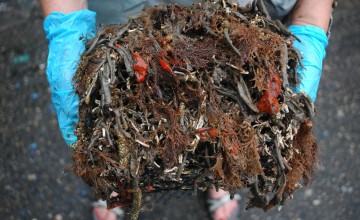
Mark
Torchin
The tropics are believed to be more resistant to invasive species compared to temperate regions. More native biodiversity results in increased competition, predation and parasitism, which leave fewer opportunities to invade. Is that really the case?
Research Focus
My lab’s research focuses on coastal marine ecology with an emphasis on host-parasite and consumer interactions, infectious diseases and biological invasions. I focus on how trophic interactions such as parasitism and predation alter populations, community structure and ecosystems. Parasites are common in many systems, yet their interactions with free-living communities are often poorly understood. This is particularly true in marine and estuarine environments. The land-sea interface is a region of high productivity and biological diversity, but it is changing at an accelerated pace due to increasing human pressures including biological invasions. This provides both research opportunities as well as urgency for understanding how to manage these ecosystems. My lab is working on biological invasions across tropical and temperate systems developing a global perspective on factors driving invasions. With collaborators around the world, we are developing a latitudinal framework approach to examine factors (a) influencing patterns of marine diversity, (b) driving invasions and (c) facilitating parasite/ disease transmission in coastal regions. My research is at the intersection of biological invasions and parasite/ disease ecology.
Additional links
Contact
Research Overview
What would the world look like without parasites?
Parasites are often considered 'bad' but actually they are a natural part of ecosystems and biological diversity. Parasites control host populations, which prevents hosts from becoming excessively abundant. Parasitism is the most common lifestyle on Earth and it may even promote species coexistence and stabilize ecosystems.
Are the tropics more resistant to marine invaders than the temperate zones?
The idea is that tropical regions and their native biodiversity are better at resisting invasive species than temperate regions due to high biodiversity and strong biotic interactions like predation, parasitism and competition. We are testing this hypothesis by using the same experiments across a latitudinal framework that has not been applied in marine systems. The fundamental goal is to learn how biotic interactions shape invasions and shape the biodiversity of marine communities in general.
What happens when you remove parasites from an ecosystem?
Most people think of parasites and diseases as being detrimental to the overall health of an ecosystem. But researchers are now realizing that parasites and pathogens are consumers that have important roles in ecosystems. When we discuss disease ecology, people tend to focus on emerging diseases or outbreaks in a particular place, not necessarily the underlying infectious processes that connect communities and that might be keeping ecosystems healthy. Parasites and pathogens are normal components of ecosystems and contribute to biodiversity. We are now beginning to ask if it is possible to use parasites to understand fundamental principles in patterns of biodiversity.
Some other research questions
Do native predators and parasites control marine invaders? How do consumer interactions, shape the diversity you see on the rocks in the intertidal zone or on tropical or temperate reefs? Are predators and parasites more important in limiting invasions in the tropics compared to higher latitudes? In other words, are you more likely to get eaten in the tropics than in the temperate zone — whether it’s a by parasite, a predator or something that is taking a little bite like a mosquito or a browser like a deer?
Education
Ph.D., University of California, Santa Barbara, 2002
M.S., University of Oregon, 1994
B.A., University of California, Santa Barbara, 1991
Selected Publications
Miura, O., M.E. Torchin, E. Bermingham, D.K. Jacobs, R.F. Hechinger (2012). Flying shells: historical dispersal of marine snails across Central America. Proceedings of the Royal Society of London 279:1061-1067. doi: 10.1098/rspb.2011.1599
Freestone, A.L, R.W. Osman, G.M. Ruiz, M.E. Torchin (2011). Stronger predation in tropics shapes species richness patterns in marine communities. Ecology 92: 983-993.
Roche, D.G., B. Leung, E.F. Mendoza Franco, M.E. Torchin (2010). Higher parasite richness, abundance, and impact in native versus introduced cichlid fishes. International Journal of Parasitology 40:1525–1530
Torchin, M.E. and C.E. Mitchell (2004). Parasites, pathogens and invasions by plants and animals. Frontiers in Ecology and the Environment 2: 183-190.
Torchin, M.E., K.D. Lafferty, A.P. Dobson, V.J. McKenzie, A.M. Kuris (2003). Introduced species and their missing parasites. Nature 421: 628-630.


